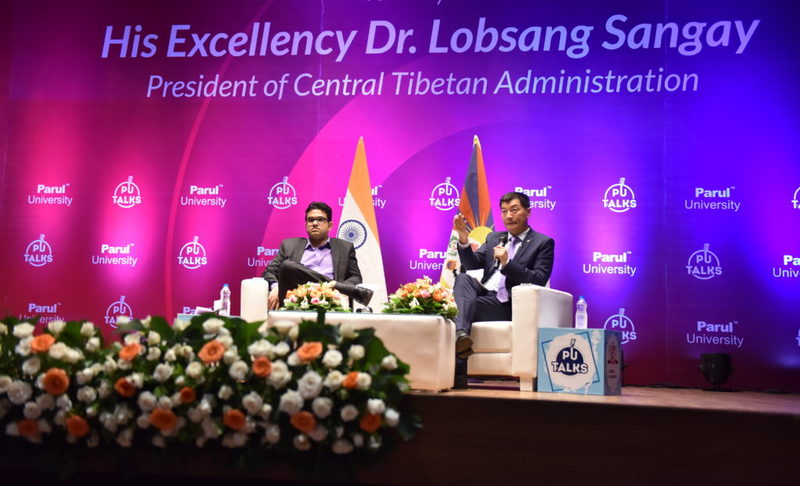Vadodara, Gujarat —“As long as China is relevant, Tibet is relevant,” said Dr Lobsang Sangay, President of the Tibetan-government-in-exile. Since India and Tibet are very much connected, the Tibetan President urged to work and grow together as a team.
The President of the Central Tibetan Administration (CTA) Dr Lobsang Sangay as a part of the official tour to Gujarat visited Parul University in Vadodara, Gujarat. President Sangay was warmly escorted to the dais of the university auditorium.
The moderator of the event delivered a welcome speech and gave a brief bio-data of the President for the general audience and guests in the hall. Dr Devanshu Patel, President of Parul University presented a book of Mahatma Gandhi who is an epitome of non-violence to the Sikyong as a token of welcome. President Dr Sangay addressed the Students, faculty members and guests gathered in the auditorium.
In his address, the Tibetan President expressed gratitude to the government and people of India for the love and kindness they have shown not only by hosting the Tibetans for the last 60 years but doing the most they could for the Tibetan freedom struggle, the Official media of the CTA reported.
The Tibetan leader called it a law of karma which has bounded India and Tibet over time and still persists to bound together. Dr Sangay reflected back to the 7th and 8th century when Tibetan scholars came to India and learned Sanskrit language and brought back Buddhism to Tibet.
President further noted that India has given birth to great leaders such as Mahatma Gandhi who was a consequential advocate of non-violence and said that His Holiness the Dalai Lama is one great admirer and follower of the principles laid out by Mahatma Gandhi.
“We Tibetans also follow Non-violence (Ahimsa) as our path to seek our basic freedom,” said President Sangay while admitting the unique connection of spiritually, environmentally, historically and geographically between India and Tibet.
President asserted that though India is the guru and the Tibetans are its Chela (student) in this equation but for India, there is no better student like the Tibetans as they have successfully preserved the ancient knowledge of Buddhism.
As for the relationship concerning the environment, the President commented on the major river that flows down from Tibet into Asia and where India draws its major source of livelihood from these major rivers as Tibet is known as the third pole or water tower of Asia.
Speaking on the situation inside Tibet, President Sangay pointed out that Freedom House Index report lists Tibet as the second least free country in the world for three consecutive years after Syria.
He further spoke about monasteries and nunneries in Tibet that were destroyed in the 1950s and 60s by the Chinese Communists, Monks, and Nuns that were disrobed.
At a time when Tibet was dealing with the depraved situation, the kind help of India came into Tibet’s rescue. Gradually, monasteries and nunneries were built brick by brick in India, Nepal, and Bhutan due to which Buddhism civilisation revived all through the Himalaya belt. President, therefore, expressed gratitude towards India for their generosity.
“Although China has destroyed and demolished monasteries in Tibet, Tibetans practices Buddhism in their private space and social space so Buddhism still remains strong in Tibet”, informed Dr Sangay.
President further proclaimed that just as India prevailed against the Britishers under the leadership of Gandhi, Tibet too shall prevail and succeed under the leadership of His Holiness the Dalai Lama. He then urged the support and cooperation of India.
Dr Sangay concluded by thanking and lauding the President of Parul University and his family for investing in education.
Followed by a series of questions from the audience. Dr Sangay answered all the questions enthusiastically. In his answers, President talked about the importance of culture in the preservation of one’s identity. He further advocated the need for education of heart with modern education to become successful in one’s life.
President noted that education is the number one priority of the Central Tibetan Administration and asserted that education is the foundation of any nation. He further spoke about China’s policy in various countries which is leading to the same situation as what has happened to Tibetans.
“As long as China is relevant, Tibet is relevant,” said Dr Sangay. Since India and Tibet are very much connected, President urged to work and grow together as a team.
Finally, Dr Patel delivered a vote of thanks and lauded Tibetan President for being an exuberant leader and promised to help and extend help to Tibetan students or any other help that they can provide.
Dr Patel felicitated the Tibetan President with Symbol of Peacock, National bird of India which signifies prosperity and divinity. After the event, while addressing the local media of Vadodara, Dr Sangay expressed his sadness and offered his condolences on the demise of former External Affairs Minister, Sushma Swaraj.


![Tibet has a rich history as a sovereign nation until the 1950s when it was invaded by China. [Photo: File]](/images/stories/Pics-2024/March/Tibet-Nation-1940s.jpg#joomlaImage://local-images/stories/Pics-2024/March/Tibet-Nation-1940s.jpg?width=1489&height=878)
















